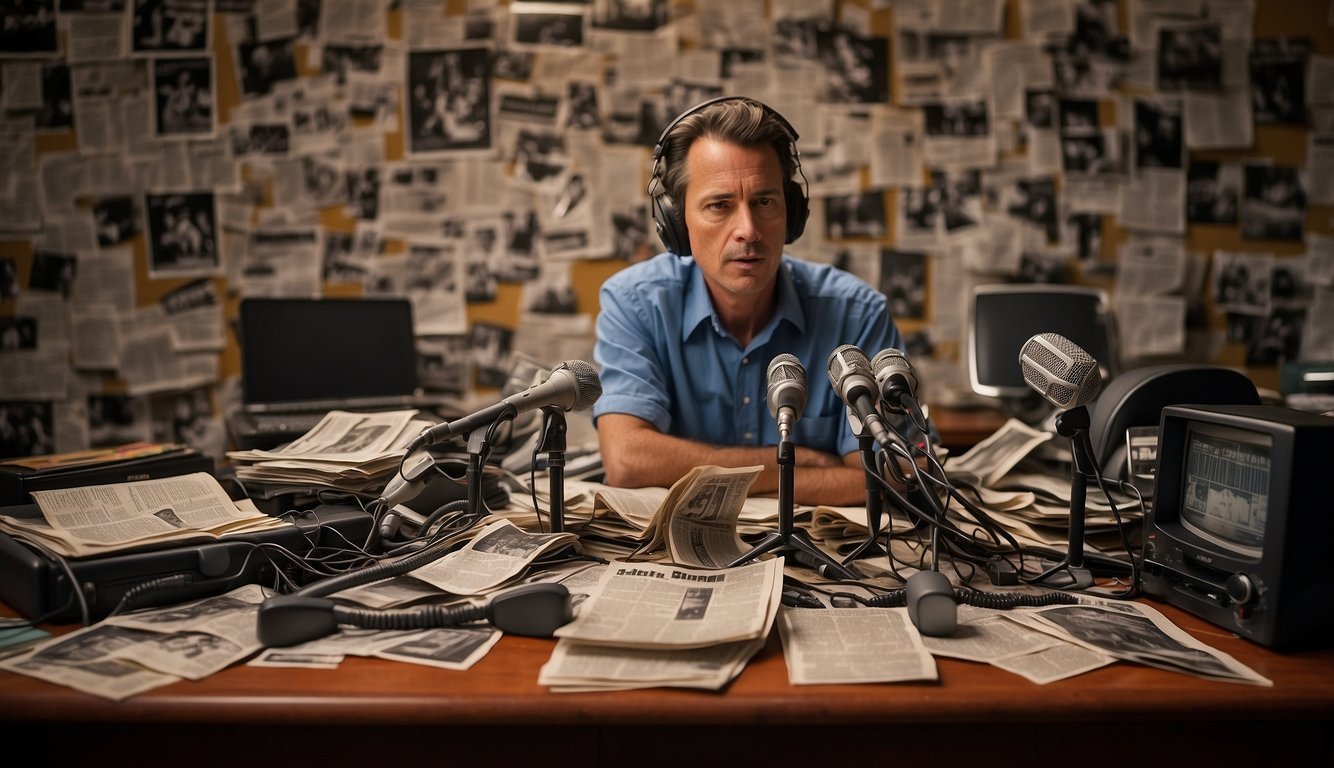Documentary Review: Curry & Cyanide: The Jolly Joseph Case (2023)
A Riveting True Crime Tale
Curry & Cyanide: The Jolly Joseph Case (2023) is a chilling Netflix documentary that meticulously narrates the story of Jolly Joseph, a woman linked to six cyanide murders over 14 years in Kerala, India. Detailing each horrific incident, the film sheds light on the infamous Koodathayi Cyanide killings, making it one of the most shocking true crime tales to come out of the region. Directed by National award winner Christo Tomy, the documentary delves into the intricate details of the case, featuring interviews with key individuals and presenting compelling insights into the grisly events.
Set in the serene town of Koodathayi in northern Kerala, the documentary juxtaposes the region's picturesque landscape with the dark, sinister actions attributed to Jolly Joseph. It provides a thorough examination of how she allegedly poisoned family members, from her mother-in-law to a two-year-old child, creating a stark contrast between the town's idyllic appearance and the horrifying reality of the murders.
The 95-minute film not only recounts the sequence of murders but also explores the psyche of Jolly Joseph, who continued her deadly spree for over a decade without raising significant suspicion. Through interviews with her brother-in-law, sister-in-law, and others closely involved in the case, the documentary offers valuable perspectives on the motivations and consequences of her actions, making it a gripping watch for true crime enthusiasts.
Overview of 'Curry & Cyanide: The Jolly Joseph Case'
This documentary delves into the grim events surrounding Jolly Joseph, involving multiple murders using cyanide in the Koodathayi region of Kerala. Curry & Cyanide: The Jolly Joseph Case explores both the intricate details of the crimes and the broader legal and societal impacts.
Production Background
Curry & Cyanide: The Jolly Joseph Case is directed by Christo Tomy. The filmmakers utilized extensive research, combining archival footage, personal interviews, and reenactments to provide a holistic view of the case. The production aimed to shed light on the complexities of the investigation and the individuals involved. The documentary was produced with the support of Netflix, offering a platform that guarantees wide reach and accessibility.
Synopsis
The documentary recounts the chilling series of cyanide poisonings that took place over a span of 14 years. Jolly Joseph, the main suspect, is connected to the deaths of six family members, including her mother-in-law, her father-in-law, and her first husband. The narration thoroughly examines the methods used by Jolly, the gradual unraveling of her crimes, and the eventual legal proceedings. The detailed storytelling helps to paint a comprehensive picture of the monstrous acts committed.
Release and Reception
Released on Netflix on December 22, 2023, the documentary quickly gained attention for its gripping narrative and thorough investigation. Viewers and critics praised it for its meticulous attention to detail and the emotional depth of personal interviews. Rotten Tomatoes and IMDb noted favorable reviews, highlighting the documentary's ability to balance factual reporting with narrative engagement. The reception underscored the film's success in bringing a tragic yet important story to a global audience.
Critical Analysis
"Curry & Cyanide: The Jolly Joseph Case" impresses with its meticulous attention to cinematography and visuals, while also presenting a coherent narrative structure and well-paced editing.
Cinematography and Visuals
The documentary features compelling cinematography, capturing the essence of Kerala's picturesque landscapes juxtaposed with the grim nature of the crimes. The use of close-ups and wide shots effectively conveys emotion and context.
The lighting and color palettes shift to match the mood of the scenes, enhancing the storytelling. The interviews are crisply framed, providing a professional look that maintains viewer engagement.
Narrative Structure
The narrative is structured in a way that guides the audience through the complexities of the case without causing confusion. It starts with an introduction to the main subjects and gradually reveals key events and findings.
An effective use of flashbacks offers historical context, aiding in understanding the motivations and actions involved. The documentary balances dry facts with personal stories, making it both informative and emotionally resonant.
Pacing and Editing
The pacing of "Curry & Cyanide" maintains a sense of urgency without overwhelming the viewer. Scenes are edited to ensure a smooth transition between interviews, reenactments, and original footage, keeping the narrative flow intact.
The editing also ensures that vital information is revisited at key points to reinforce important details. Timely use of graphics and textual information helps clarify complex legal and investigatory processes. The overall editing choices contribute to a compelling viewing experience that holds the audience's attention throughout.
Themes and Interpretations
The documentary "Curry & Cyanide: The Jolly Joseph Case" explores key themes relating to true crime storytelling, societal impact, and ethical considerations. Each theme is intricately woven into the narrative, illustrating the complexities and darker dimensions of the case.
True Crime Storytelling
The film uses a meticulous approach to capture the essence of the Koodathayi Cyanide killing case. Directed by Christo Tomy, the story unfolds over 14 years, involving six murders allegedly committed by Jolly Joseph. It includes detailed accounts from family members, providing valuable perspectives.
Visuals play a crucial role in conveying the eerie atmosphere of Koodathayi. Interviews and archival footage are balanced to give a full picture of the events. Pacing and editing contribute to maintaining suspense and engagement throughout the 95-minute runtime.
Societal Impact
The documentary does not just focus on the crime but also sheds light on broader societal issues. Kerala is highlighted for its high literacy rate and decent quality of life, contrasting sharply with the macabre events of the case. This juxtaposition exposes deeper societal vulnerabilities.
By involving community sentiments and reactions, the film discusses the fear, mistrust, and uncertainty that gripped the town of Koodathayi. Media coverage and public discourse reveal how sensational cases can affect the collective psyche of a community.
Ethical Considerations
Ethical considerations are pivotal in documenting ongoing legal cases. Given that the case was still under trial, the filmmakers had to navigate sensationalism versus sensitivity. Balancing these aspects ensures victims' families are respected while telling an engaging narrative.
Interviewing family members and using explicit details posed ethical dilemmas. The film manages these by providing multiple viewpoints and not trivializing the tragedy. Issues of privacy and responsibility are underscored, stressing the importance of ethical integrity in true crime storytelling.
Interviews and Expert Opinions
The documentary features insights from legal experts and investigative journalists to provide a comprehensive analysis of the Jolly Joseph case.
Legal Perspectives
Legal experts in the documentary discuss the intricacies of the judicial process surrounding the Jolly Joseph case. They explain the prosecution's approach, evidence gathering, and court proceedings.
They also shed light on the challenges faced by the defense in a high-profile case involving multiple murders. Specific attention is given to the use of forensic evidence, particularly cyanide poisoning and its detection.
The documentary further explores the ethical considerations in the legal system, including media influence on judicial outcomes. Legal experts also provide valuable context on the historical legal precedents relevant to this case.
Investigative Journalism
Investigative journalists provide a gripping account of uncovering the details of the Koodathayi Cyanide killings. They recount the months spent gathering information, interviewing key witnesses, and piecing together the timeline of events.
Journalists reveal the difficulties faced due to local resistance, incomplete records, and the emotional toll of reporting on such a tragic case. Their contributions highlight the importance of thorough, unbiased journalism in solving complex criminal cases.
The documentary emphasizes the role of journalism in keeping public attention on the case, thereby ensuring a fair trial. Essential journalistic practices, such as fact-checking and source verification, are prominently featured in the investigative efforts.
Viewer Feedback and Impact
The documentary "Curry & Cyanide: The Jolly Joseph Case (2023)" has elicited a spectrum of responses from its audience and has prompted discussions on its cultural and future implications.
Audience Reactions
Viewers have expressed a mix of shock, fascination, and revulsion toward the documentary. Many found it alarming how Jolly Joseph allegedly orchestrated the deaths of six family members over 14 years. The detailed interviews with family members, including her brother-in-law and sister-in-law, provided emotional insight, making the story even more engrossing and disturbing.
Some appreciated the careful presentation of facts, while others criticized it for being sensationalist. Online reviews indicate a strong engagement, with discussions thriving in forums and social media platforms. The documentary sparked debates about trust, betrayal, and the hidden darkness within seemingly ordinary lives.
Cultural Impact
"Curry & Cyanide" has shed light on some darker facets of society, contributing to broader conversations about crime in everyday life. Set in Kerala, a state known for its high literacy and quality of life, the documentary has highlighted the stark contrast between societal expectations and the harsh realities of some lived experiences.
The case’s setting in the small town of Koodathayi has made audiences question how such heinous acts could go undetected for so long in close-knit communities. This narrative challenges assumptions and prompts viewers to reflect on the nature of crime and justice in modern society.
Future Implications
The documentary has potential implications for future discussions and documentation of crime stories. It underscores the importance of in-depth investigative journalism and the need for thorough legal proceedings. By presenting the case of Jolly Joseph, it brings attention to how media can influence public perception and potentially affect the outcomes of ongoing trials.
Moreover, "Curry & Cyanide" may inspire similar true-crime documentaries in regions often overlooked by mainstream media. The impact on legal reforms, community vigilance, and future crime reportage could be significant, urging a more vigilant societal approach to detecting and preventing such crimes.
Conclusion
The Jolly Joseph Case highlights a story marked by intricate and chilling details, keeping the viewer gripped throughout the 95-minute runtime.
With the direction of Christo Tomy, a National Award winner, the documentary maintains a balanced and factual approach, despite the ongoing legal proceedings concerning Jolly Joseph.
Insightful interviews from key individuals such as retired cop KG Simon, Jolly's family members, and her legal advocate lend credibility and depth to the narrative.
The documentary does not shy away from presenting the horrifying nature of the crimes, including the tragic loss of innocent lives, emphasizing the grim reality behind the story.
The presentation is both thorough and thought-provoking, making it a recommended watch for those interested in true crime stories.
Through careful storytelling and comprehensive investigation, Curry & Cyanide stands out as an engaging piece of documentary filmmaking.


